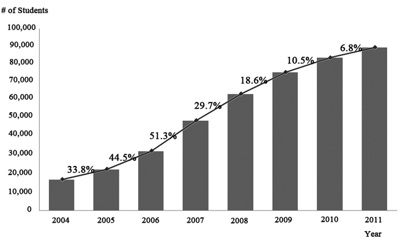
After the Education Reform Council meeting on Oct. 29, the government officially announced its plan to push ahead with its Study Korea 2020 Project, which aims to attract 200,000 foreign students to Korea by 2020. There have been varying views on the recent success and the failure of the original Study Korea Project, thus raising questions on the effectiveness of the new plan.
The Study Korea 2020 Project is the second phase of the Study Korea Project initiated by the Ministry of Education, Science & Technology (MEST), which has been running since 2004. Aimed to ultimately lead Korea in becoming the education hub of northeast Asia, the Study Korea Project worked to promote Korea’s image as a study-abroad destination, provide a link between developed and developing countries, and strengthen the competitiveness of Korean education.
When the project was initiated in 2004, it planned to attract 50,000 foreign students to Korea by 2008, but with already more than 49,000 students in 2007, the government extended and expanded the target to one of 100,000 foreign students in Korea by 2012. This year, statistics show that there are approximately 87,000 foreign students in Korea. The project will now kick off its second phase—of reaching 200,000 foreign students by 2020.
Considering the increase in the number of foreign students in Korea since 2004, the Study Korea Project can be viewed successful. However, what was once a rapidly increasing speed is now slowing in pace.
Based on statistics by the MEST, in 2005 there was a 33.8 percent increase in foreign students from the previous year. This growth continued, recording 44.5 percent in 2006 and 51.3 percent in 2007. It then started to slow down. In 2008, the increase rate decreased to 29.7 percent, then 18.6 percent in 2009, 10.5 percent in 2010 and only 6.8 percent in 2011.
MEST has pointed out several issues with the situation in 2007, most of which still apply today. These concerns include poor university conditions to house foreign students due to a lack of basic infrastructure, insufficient scholarship programs, inadequate immigration controls and support systems, and poor post management such as employment opportunities.
“The university is very helpful when it is an issue related to the university or studies, but not much when it comes to adapting to Korean society,” Ane Bermudez (Korea University, 1) said. “More supervision may be a possible solution.”
University professors often encounter foreign students who come to their offices with a lot on their minds.
“Generally, foreign students find it hard to adjust to Korea and the educational system here,” said a professor who wished to remain anonymous. “The language barrier and lack of support in this area are probably the biggest problems, followed by their concern for employment in Korea.”
Despite such critical views on this issue, the MEST suggests the Study Korea 2020 Project will be able to resolve the problems. Moving on from its attempt to increase the number of foreign students, the MEST states the new project will focus more on qualitative management.
“We plan to achieve qualitative management of foreign students by attracting and supporting excelling foreign students, periodical care of the students upon their returning home and resettlement, and further development of the organizational system,” said Lee Kyung-min, a member of the Division of International Cooperation. “Also, we are supporting employment for foreign students in Korea by providing recruitment expo events and other programs.”
More precisely, the MEST is working to increase the Global Korea Scholarship program; provide a one-stop total service through the total foreign student system, which will manage foreign students’ entire stay in Korea from entrance to departure; improved settlement environment; and foster an organization to oversee foreign students.
“We are enhancing the International Education Quality Assurance System, and this will prevent unprepared universities from attracting foreign students,” Lee said. “Thus we aim to increase the competence of universities in attracting students, and welcome excelling foreign students.”

